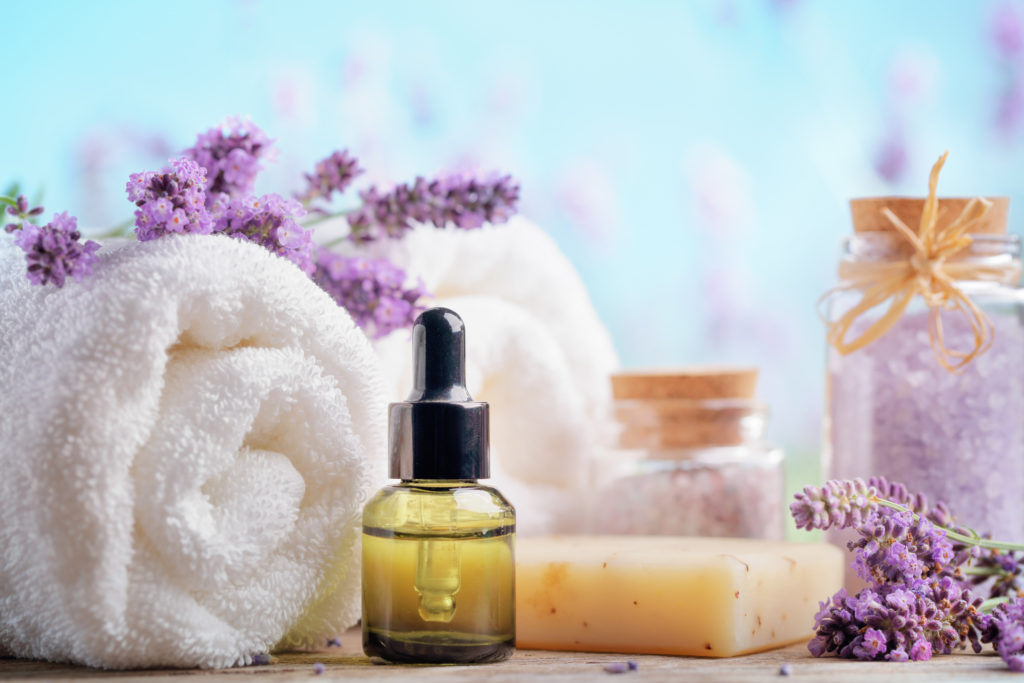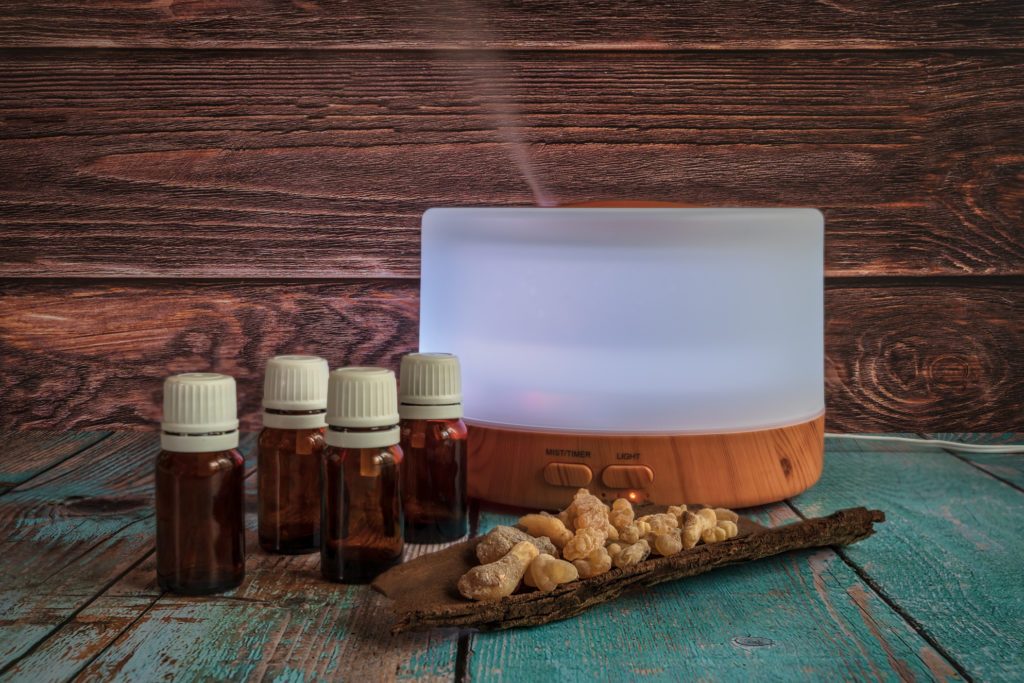Anyone who has had trouble sleeping will understand the struggle of finding a sleep remedy that works. White noise, relaxation techniques, even drugs are all employed in the search for a good night’s sleep. But have you explored the world of essential oils? Essential oils for sleep are certainly not a new idea. Oils were used by the Ancient Egyptians, the Greeks, and in Indian Ayurveda medicine. Today, we have a better grasp of the science behind essential oils, and many intriguing studies that suggest essential oils could be the key to good sleep. So, what essential oils help you sleep? How do they work? And will they finally help you get that elusive eight hours that you’ve been dreaming (or not) of?
What Are Essential Oils?
Essential oils are liquids that are extracted from plants. This may be through pressing the plant, to physically squeeze the natural oils from the stems, flowers, or leaves. Oils can also be obtained through distillation, usually using steam to rupture the cell membranes, thus releasing the essential oils. These then collect in a condenser. Some essential oils are collected more quickly using a solvent method. This method is more cost-effective but may result in a slightly lower quality of essential oil. These oils are then used in a variety of products, ranging from toothpaste to insect repellant. Therapeutic essential oils are used to help reduce the symptoms of various ailments, or as preventatives. Some oils can be ingested (never do this without consulting a medical professional) or applied directly to the skin when diluted with a carrier oil. The most common way of using essential oils, however, is through inhalation.
How Do Essential Oils for Sleep Work?
So many people use essential oils for sleep, but do they really work? How can smelling something pleasant actually have an impact on our health and wellbeing? Well, it turns out that our olfactory sense, or sense of smell, are closely hardwired to may areas of our brain. Inhaling the fragrances of essential oils can have a surprising impact on many bodily systems by directly interacting with the brain. In 2016, the University of Northumbria in the United Kingdom presented interesting findings at the British Psychological Society Conference.
They had done significant studies on essential oils, and discovered the following:
- Rosemary increases alertness and improves memory.
- Lavender decreased alertness and gave a feeling of calmness and contentment.
- Peppermint also increased alertness and seemed to have a positive impact on long term memory.
Every essential oil may contain up to 60 compounds known as phytochemicals. Many of these give the plant its unique aroma and are used primarily for this purpose, such as peppermint in toothpaste or citronella in insect repellant. However, many of these compounds also have potential therapeutic effects and can stimulate the brain into producing more (or less) of certain chemicals to help regulate or balance the systems within the human body. Using essential oils for insomnia should be effective as long as there is no deep, underlying issue that you need to speak to a doctor about. Chronic pain, for example, should be discussed with a medical professional. Sufferers of severe stress or anxiety should also seek medical assistance. Essential oils are ideal for periods of short term insomnia and are certainly something to try when all other options have been exhausted. Always consult a doctor before using oils if you are pregnant or breastfeeding.

Benefits of Essential Oil Blends for Sleep
Essential oil blends for sleep are when two or more oils are mixed in order to complement each other and produce a more powerful effect- or simply a more appealing fragrance. What are the best essential oils for sleep and relaxation?
For Sleep
The best essential oils for sleep are ones that allow body and mind to relax completely. Popular blends that help you drop off to sleep include: · Lavender and chamomile · Ylang-ylang and marjoram · Lavender and cedarwood · Lavender and Bergamot · Vetiver and marjoram Any of these blends will promote relaxation and a drowsy state of mind, promoting a good night’s sleep.
For Stress and Anxiety
One of the most common causes of poor sleep is stress. Worries that have not been resolved often become more pronounced in the quiet of the night, with nothing to distract you from them. Essential oils that allow your mind to relax or help you focus on relaxation techniques can be very beneficial in reducing the amount of stress you feel. Less stress naturally means a better night’s sleep.
Other Benefits
Many essential oil blends have other benefits, which are a bonus. Most of these will be natural therapeutic effects of the essential oil. Here are a few examples: · Lemon oil promotes good sleep by increasing the mood, but it can also open up the airways and help clear the nasal cavity. · Marjoram is often used in sleep blends and may also reduce the pain of a headache. · Vetiver is very calming, and may also speed up the body’s healing process.

What Essential Oils Are Good for Sleep?
Blends are beneficial, but sometimes it’s good to understand what essential oils are good for sleep. Certain plant oils seem to have a very relaxing or soothing effect on the mind, making them ideal for those struggling to sleep. Here are just a few of our favorites.
Lavender
Lavender is probably one of the best known essential oils for sleep. Studies have found that the chemicals in lavender interact with specific receptors in the brain, which give the plant relaxing and possibly even anti-depressant effects. Lavender has been used for centuries as one of the most potent essential oils for sleep and anxiety. Lavender oil has been found in Ancient Egyptian urns and was also used by the Romans. Today, over 30 species of lavender are grown worldwide, and the oil is recognized as one of the best for helping insomniacs gently drift off to sleep.
Jasmine
Jasmine is one of the best oils for sleep due to its sedative nature. This night-blooming plant helps ensure your blooming is done in the daylight. Jasmine may be particularly effective for those suffering from anxiety. A study of 30 patients found that their anxiety levels reduced by a statistically significant level after inhaling jasmine oil vapors. Even those with a good state of mind can benefit from the calming effects of Jasmine, which can help relax the whole body via a calmative effect on the central nervous system.
Lemon
It might be surprising that lemon is in our list of oils to help sleep, as it is so upbeat and vibrant. Citrus-scented oils are often great for essential oils for relaxation and sleep, as when your mood is higher, you actually sleep much better. Low mood and depression can prevent sleep and produce chemicals that prevent you from falling asleep. Lemon oil can also boost the blood supply to the brain, which allows the brain to better regulate the internal systems, which allow you to fall asleep.
Vanilla
Vanilla is one of those essential oils to help sleep come a little more easily. It’s the only plant in the orchid family that humans cultivate to eat and has many therapeutic effects- including as a relaxant. It’s so well known as a mood elevator and relaxant that some hospitals use it to calm patients before MRI scans. Be aware; vanilla is widely synthesized to ensure you’re getting the therapeutic effect look for natural vanilla essential oil.
Sandalwood
You may be surprised to learn that Sandalwood is one of the many essential oils good for sleep. Sandalwood has a deep, earthy smell, often described as musky. This enticing aroma is often used in skincare products and shampoo but is also good for promoting sleep. It may also reduce feelings of anxiety. It’s also one of the best essential oils for relaxation so that it can be used after a hard day at work, or to support other relaxation techniques such as yoga, massage, or meditation.
How to Use Essential Oils for Sleep
Many people shy away from essential oils because they simply don’t know how to use essential oils for sleep. They worry about using too much, too little, or creating a toxic atmosphere. Thankfully, it’s very easy to safely use essential oils to aid with sleep problems. When using essential oils for sleep, diffuser-type units are ideal. A diffuser is an electronic device that combines essential oil with water and heats it to create scented water vapor. This gently fills the room with the therapeutic effects of the essential oil. Two to three drops of oil are usually sufficient. Another method is to dab a couple of drops of oil on a tissue and places the tissue inside your pillow. This will allow you to directly inhale the oil while laying in bed. Be careful not to get the oil directly on your skin, as undiluted essential oil can cause skin irritation. Oil burners and scented candles are another way to gently fragrance any room. However, never fall asleep with candles lit. Use them to fragrance your room before you sleep, then blow all candles out, even the candle in an oil burner, before turning in for the night. An oil burner is a simple piece with space for a small candle at the bottom and a shallow dish above it. Many are very decorative. The dish is filled with a little water and a drop or two of essential oil. The candle is lit underneath the oil, and the heat gently evaporates the fragrance around the room. It’s possible to create your own essential oil recipe for sleep, by blending several oils with the right qualities. There are several ideas for blends above, or you could experiment and create your own unique blend.
Where to Buy Essential Oils to Help Sleep
There are many places to buy essential oils for sleep. Some pharmacies will sell them and may even be able to advise you on the helpful properties of each oil. Specialists like doTERRA offer a range of blends designed for very specific ailments, including relaxation and sleep. Even major retailers like Amazon stock essential oils ranging from individual oils to blends specifically for sleep. Wherever you decide to buy your oils, check that the oils are therapeutic grade and that they aren’t synthetic. You may also want to check that the plants are sourced sustainably. Some oils are labeled as organic, meaning no chemical pesticides were used during the growing process. This gives some people more peace of mind about the purity of the oil, but as long as it says “therapeutic grade,” the oil should be fine. Hopefully, our introduction has opened your eyes to the possibilities of essential oils. Now it’s all about finding your favorite essential oils that help you sleep.



One Reply to “Essential Oils for Sleep: Do They Really Work?”
buy buspar online cheap